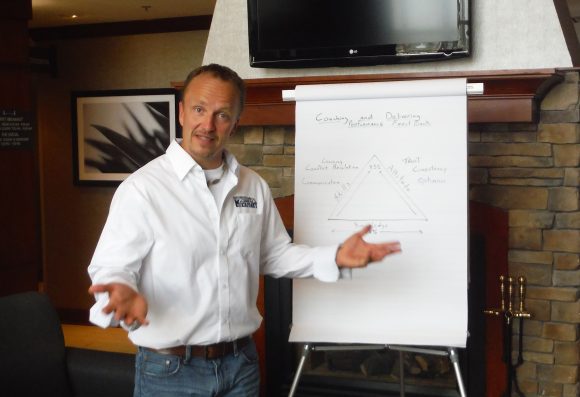On today’s podcast I interviewed Trevor Blondeel, the founder of Operations Kickstart and the host of the podcast, Mindfulness Manufacturing.
Trevor uses mindfulness techniques to coach manufacturing executives so they can better lead their companies.
The idea is that if his clients become more conscious of their feelings and their current behavior, it will inspire sustainable change in how they work with others and lead.
If you’re interested in the topics of coaching and understanding yourself better I think you will like this episode.
Facebook: https://lnkd.in/dB_nzFzt
Instagram: https://lnkd.in/dcxjzVyw
Twitter: https://lnkd.in/dDyT-c9h
Noah Graff: Give me a quick summary of Operations Kickstart and how you came to start it.
Trevor Blondeel: We work with manufacturers to connect (management) to the shop floor.
I ran manufacturing plants for 25 years. I made a lot of mistakes and got a lot of battle scars. And I did a lot of actions well.
In 2016, I went off and started (Operations Kickstart) to help solve the problem of “disconnect.” Often we have great owners of manufacturing plants and businesses who really enjoy their teams and want to do well, but they get disconnected. That’s the problem that we solve. Everyone has great intentions, but sometimes our intentions don’t land with the perceptions of others.
Graff: What caused you to pivot in your career?
Blondeel: It definitely was a lot of personal growth. I started reading more on emotional intelligence. I started doing mindfulness practice. I really started exploring and heightening my own self-awareness— seeing that the way that I thought people saw me wasn’t always that way. I started learning more. I was blessed with some great training and some great mentors and coaches who helped me identify that just by shifting a couple behaviors, I could make such an impact for others.
It’s like that first hour in manufacturing. If you start with a good vibe and you start with a green hour and everybody’s organized and aligned, there’s a better chance you’re going to have a better production day.
When you come in, and your boss is not in a good mood, that kind of spins off to the rest of the group.
Graff: Give me the general definition of mindfulness. How you use it in coaching manufacturing executives?
Blondeel: Where your two feet are. Where you are planted right now, is your mind where your two feet are?
Are you present in what you’re doing right now? Because often we have 10 different tasks on our mind, and we’re jumping from task to task or from conversation to conversation because we have a lot to get done. For me, mindfulness is taking that breath, realizing that right now I’m talking to Noah.
I’m not checking my phone. I’m just focused on listening to what you’re saying and really getting my mind in a mode where I’m not thinking about what I want to say next. I’m actually just taking in what you’re saying to me.
Graff: Millennials are a huge part of the workforce now. How does your mindfulness coaching help for working with millennials.
Blondeel: I have a 23-year-old son. All I know is that he has a unique perspective that I learn from. Whether it’s millennial or whatever label we want to have on it, every generation is a little bit different, and that’s actually what manufacturing needs. We need younger people, especially in the trades.
They’re going to be more curious and challenge a little bit more. It’s not going to be the “come to work I’m getting paid a good dollar, so I’m just going to be quiet.” So there’s a greater need to add value.
It’s going to require us to have more dialogue back and forth, and it’s going to be less direction and more conversation.
They understand the bigger picture. They understand how they connect to the vision, and they understand how their value is connected to what we do for this plant and this community. You don’t have to motivate people. You don’t have to push anybody because they’re connected and they’re driven.
Graff: Your website says that 25% of manufacturing workers are engaged at work, 8% less than the national average of 33%, according to Gallup. Making manufacturing the least engaged industry.
Blondeel: Gallup surveys people, asking, “How engaged are you in your work?” “Do you enjoy working there?” “How passionate are you?” They look at the different industries, at how excited people are.
Manufacturing has one of the lowest engagement rates and one of the highest pay rates.
A lot of times we’re (telling) people, “trades get paid really well in manufacturing, and there’s some good benefits, and you can be secure for life financially.”
A lot of that is true, but I believe we can have both (high workplace engagement and pay rates). We can create an environment where we can connect to the people and we all have value.
Question: What do you do to connect with other people in your workplace?
Podcast: Play in new window | Download




